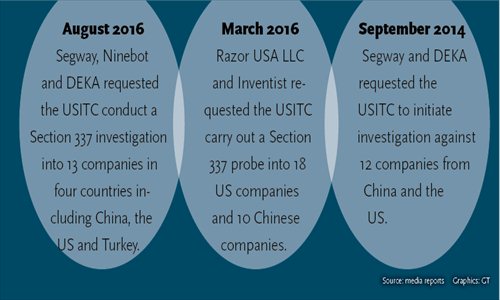
(Graphics/GT)
Industry players 'should innovate, improve consumers' confidence'
Domestic self-balancing vehicle manufacturers have encountered challenges, with successive producers reportedly being charged with patent infringement and China's major metropolises banning self-balancing transport.
Companies said Sunday the urgent task for manufacturers is to boost innovation and enhance consumers' confidence.
Self-balancing scooter pioneer Segway Inc, together with Ninebot (Tianjin) Technology Co and DEKA Products Limited Partnership, on August 16 asked the U.S. International Trade Commission (USITC) to conduct a Section 337 investigation into 13 companies in four countries including China, the U.S. and Turkey, according to an announcement on usitc.gov.
According to the USITC, the six Chinese companies charged include Hangzhou Chic Intelligent Technology, Shenzhen Jomo Technology Co and Nanjing Fastwheel Intelligent Technology.
"We analyzed the patents of Segway and Ninebot to avoid copying their technologies and meanwhile, we brought forth new ideas. Currently, we have stopped exports of self-balancing vehicles to the U.S. and Europe," Zhang Lvsheng, general manager of Shenzhen Jomo Technology Co, told the Global Times on Sunday.
It is not the first time domestic self-balancing vehicle makers have been accused of patent infringement. In March 2016, Razor USA LLC and Inventist Inc asked the USITC to conduct a Section 337 probe into 18 U.S. companies and 10 Chinese companies, said a separate announcement on the website of the USITC.
In September 2014, Segway and DEKA requested the USITC to initiate an investigation against 12 companies from China and the U.S. for violating Section 337 in their exports and sales of electric self-balancing scooters and components to the US, domestic news portal eeo.com.cn reported on Saturday.
Domestic leading self-balancing vehicle maker Shenzhen INMOTION Technologies Co was part of the case in 2014. "In the Section 337 probe in 2014, we ended up settling with Segway and promised not to enter the U.S. market within three to five years," Yan Xuekai, vice president of Shenzhen INMOTION Technologies Co, told the Global Times on Sunday.
China's self-balancing vehicle industry faces the issues of unclear patent ownership, absence of safety criteria and consumers' lack of confidence in these vehicles, sources said.
The industry boomed in 2015, reaching 400 billion yuan ($59.88 billion), and the number of self-balancing vehicles sold to dealers in China was 12 million, domestic news outlet bbtnews.com.cn reported in August, citing an industry insider.
Driven by the trend, many domestic producers with little technological ability have entered the industry, rolling out products of low quality that damaged consumers' confidence, Yan explained.
Meanwhile, there are no definite standards in terms of safety, usage and design, Zhang noted.
A total of 54 explosions caused by self-balancing vehicles occurred in the U.S. in 2015, and nearly 100 fires occurred in the UK, Belgium and Hong Kong, according to eeo.com.cn.
The self-balancing vehicle industry withered in 2016. "Our production line has been shut down mainly due to patent disputes and consumers' lack of confidence in self-balancing vehicles," Zhang said, noting "most self-balancing vehicle producers saw sales decline more than 70 percent."
Recently, Beijing, Shanghai and Shenzhen, South China's Guangdong Province announced bans on self-balancing vehicles being operated on the road.
Beijing stipulated that the police will dole out 10 yuan fines as punishment if people are caught riding self-balancing vehicles or scooters, while Xiamen in East China's Fujian Province will impose a fine of 500 yuan, said the eeo.com.cn report.
Yan said this policy will have serious implications for the industry and people who need these vehicles. "Some self-balancing vehicles help workers get to their offices without being affected by traffic jams, but if the policy takes effect, there will be fewer consumers purchasing these products," Yan explained.
Zhang said this policy will not affect the industry too much because not many people look at self-balancing vehicles as a means of transportation. Most people buy these vehicles for entertainment purposes, as the speed of self-balancing vehicles can be as slow as 10 kilometers per hour and they are not as safe as bikes or cars, according to Zhang.


















































